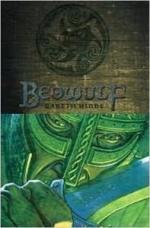When
the hero-in-battle the hand suspended,
The
arm and the shoulder (there was all of the claw
45 Of Grendel
together) ’neath great-stretching hall-roof.
[1] It has been proposed to translate ‘myrethe’ by with sorrow; but there seems no authority for such a rendering. To the present translator, the phrase ‘modes myrethe’ seems a mere padding for gladly; i.e., he who gladly harassed mankind.
[30]
XIV.
REJOICING OF THE DANES.
{At early dawn, warriors from far and near come together to hear of the night’s adventures.}
In
the mist of the morning many a warrior
Stood
round the gift-hall, as the story is told me:
Folk-princes
fared then from far and from near
Through
long-stretching journeys to look at the wonder,
5
The footprints of the foeman. Few of the warriors
{Few warriors lamented Grendel’s destruction.}
Who
gazed on the foot-tracks of the inglorious creature
His
parting from life pained very deeply,
How,
weary in spirit, off from those regions
In
combats conquered he carried his traces,
10 Fated
and flying, to the flood of the nickers.
{Grendel’s blood dyes the waters.}
There
in bloody billows bubbled the currents,
The
angry eddy was everywhere mingled
And
seething with gore, welling with sword-blood;[1]
He
death-doomed had hid him, when reaved of his joyance
15 He laid
down his life in the lair he had fled to,
His
heathenish spirit, where hell did receive him.
Thence
the friends from of old backward turned them,
And
many a younker from merry adventure,
Striding
their stallions, stout from the seaward,
20 Heroes
on horses. There were heard very often
{Beowulf is the hero of the hour.}
Beowulf’s
praises; many often asserted
That
neither south nor north, in the circuit of waters,
{He is regarded as a probable successor to Hrothgar.}
O’er
outstretching earth-plain, none other was better
’Mid
bearers of war-shields, more worthy to govern,
25 ’Neath
the arch of the ether. Not any, however,
’Gainst
the friend-lord muttered, mocking-words uttered
{But no word is uttered to derogate from the old king}
Of
Hrothgar the gracious (a good king he).
Oft
the famed ones permitted their fallow-skinned horses
[31] To run in rivalry, racing and chasing,
30 Where
the fieldways appeared to them fair and inviting,
Known
for their excellence; oft a thane of the folk-lord,[2]




